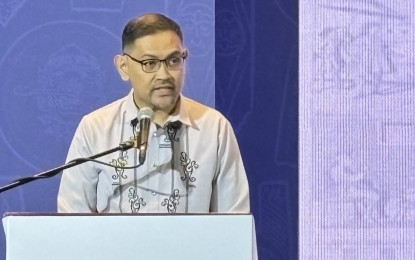
HIGH SEAS TREATY. Foreign Affairs Assistant Secretary Marshall Louis Alferez speaks during the French Embassy-organized side event, "Preparing the 3rd United Nation Oceans Conference (UNOC3)" at the 2024 Asia-Pacific Ministerial Conference on Disaster Risk Reduction in Pasay City on Monday (Oct. 14, 2024). Alferez said the Philippines is hoping to become one of the first countries to ratify the United Nations treaty protecting the high seas. (Photo by Joyce Rocamora)
MANILA – The Philippines is hoping to become one of the first countries to ratify the United Nations treaty protecting the high seas.
The landmark Biodiversity Beyond National Jurisdiction (BBNJ) Agreement, also known as the High Seas Treaty, was adopted by consensus in June 2023 and will enter into force after 60 ratifications.
“We are currently working with our Senate to complete the required domestic procedures for its ratification,” Foreign Affairs Assistant Secretary Marshall Louis Alferez said during a French Embassy-organized side event at the 2024 Asia-Pacific Ministerial Conference on Disaster Risk Reduction (APMCDRR) at PICC in Pasay on Monday.
“We are really hoping to do it before the end of the year and be one of the first dozen states parties in the BBNJ,” he added.
The Agreement has been open for signature since September 20, 2023.
To date, there are 13 countries that are now party to the treaty out of the 104 member states that signed the document.
The deal aims to serve as a framework that allows the establishment of marine protected areas (MPAs) and mechanisms to conserve habitats and species in the high seas and the international seabed area. (PNA)
